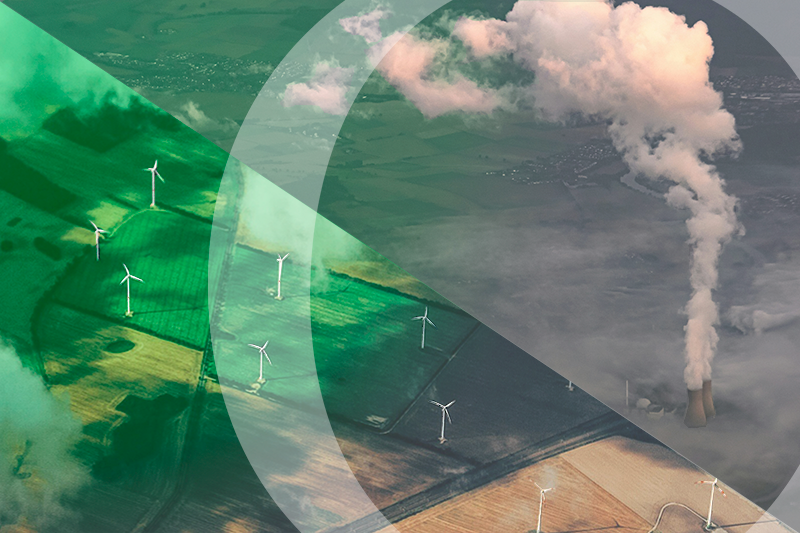Is it possible to maintain the level of wellbeing we enjoy in the Basque Country without making rapid progress in the energy transition, substantially increasing the penetration of renewable energies in the energy mix?
My answer is no, it is not possible. To explain my view, I will use some figures, explained below.
2.65. This is the number of planet Earths that would be needed if the entire global population consumed materials, energy, and other resources at the same rate as here, according to statistics published by the Basque Environmental Agency, IHOBE. If we wanted to reduce our “ecological footprint” to 1 (the planet we have), we would have to reduce our consumption of resources by 62%. The well-being of Basque society today is crucially based on the consumption of natural resources
10.1%. This is the percentage of primary energy (almost all renewable) produced in the Basque Country in 2024. This is lower than the European average (with a share of renewables in gross available energy of 19.5 % in 2023) and reflects our dependence on imports and the low development of renewables. In fact, the last wind farm installed on Basque soil, Punta Lucero, in Bizkaia, dates back to 2006, although there are currently some projects underway in the Basque Country, within the framework of the Basque Territorial Sectoral Plan for Renewable Energies, pending final approval. The current Basque energy mix, therefore, results in high levels of greenhouse gas emissions (partly related to industrial energy consumption, but also to passenger and freight transport) and, in addition, a high degree of dependence on energy produced outside the territory.
21% and 27%. These are, respectively, the increase in GDP and the reduction in greenhouse gas emissions in the Basque Country in 2005-2022. In other words, economic growth is becoming “decoupled” from emissions, although there is still a long way to go, in terms of both emissions reductions and the use of resources. There is, therefore, an opportunity to continue generating economic value in an increasingly environmentally sustainable way.
All these figures illustrate the dilemma we face as a society, especially in a context of growing social rejection of energy infrastructure projects (and, in general, all infrastructure) in the Basque Country.
We can identify, in simplified terms, three scenarios for the evolution of the energy (or sustainable) transition in the Basque Country in the coming years. Decision-makers in the political, business, and social spheres will have to take a stand on this issue and explain in detail to the citizens the reasons for their stance.
- The first scenario is to continue as we are now, gradually advancing in the energy transition but delaying the milestone of “net zero emissions,” most likely until after 2050 and leading to increases in the average global temperature of close to 3°C (according to current trends). Is this an alternative we desire as a society?
- The second scenario involves degrowth, until we reach levels of “planetary sustainability” (i.e., achieving an ecological footprint equal to or below 1, if we accept that the less developed territories of the planet will need more resources for their populations to reach acceptable levels of well-being). This “degrowth” scenario implies a drastic fall in the consumption of natural resources (including energy) and, in essence, giving up the level of material well-being we have enjoyed in recent decades. In other words, we will consume less, travel less, and have to give up many activities that generate an excessive “ecological footprint.” Is this option viable, and can we afford the economic and social costs involved?
- The third scenario involves rapidly advancing in the energy transition and a clean energy mix, in order to definitively decouple economic value creation from environmental impact. To achieve this, renewable energies must be expanded in a rational but decisive manner, while maintaining environmental requirements (such as those set out in European regulations). Alongside renewable electricity, other renewable fuels (e.g., hydrogen or biofuels) and other technologies (e.g., “negative emissions”) should be used where electrification is not an option.
This scenario also involves developing a more responsible, efficient, and circular model of production and consumption, as well as greater efficiency in the use of all types of resources, through an appropriate and balanced system of incentives, penalties, and regulations. In a complex global economic and geopolitical context, policies and programs for innovation and specialization in clean technologies and solutions must be promoted in all sectors, giving rise to a competitive and innovative Basque industrial fabric.
In my opinion, the most reasonable alternative for preserving our well-being (and that of future generations) is the latter, understanding that the transition process towards an environmentally sustainable economy is complex and will require some sacrifices (e.g., dedicating more resources to investing in innovation and developing infraestructure, such as energy networks, which will boost the region’s competitiveness and change part of our consumer culture).
A greater share of renewable energies in the Basque energy mix means making progress in reducing greenhouse gas emissions and, at the same time, helping to maintain the competitiveness (and, therefore, the capacity to generate economic value and well-being) of many industrial companies. This could be achieved through lower energy costs and exploiting opportunities to decarbonize their production processes and position themselves competitively in the markets for environmentally friendly goods and services.
To make the energy transition a reality, we must increase social acceptance of renewable energy projects and the infrastructure they require. This involves reaching broad social agreements to deploy more renewables, taking into account all costs and benefits, adequately compensating local communities, and making the most of the “built environment” to minimize environmental impact. Blocking the development of renewable energies because we are unable to reach broad social agreements will exacerbate the impact of climate change, with increasingly well-known undesirable consequences.

Jorge Fernández
Senior researcher and coordinator for the field of energy at Orkestra since March 2018. PhD in Economics, Georgetown University (Washington DC), Jorge has broad experience in the energy sector.













